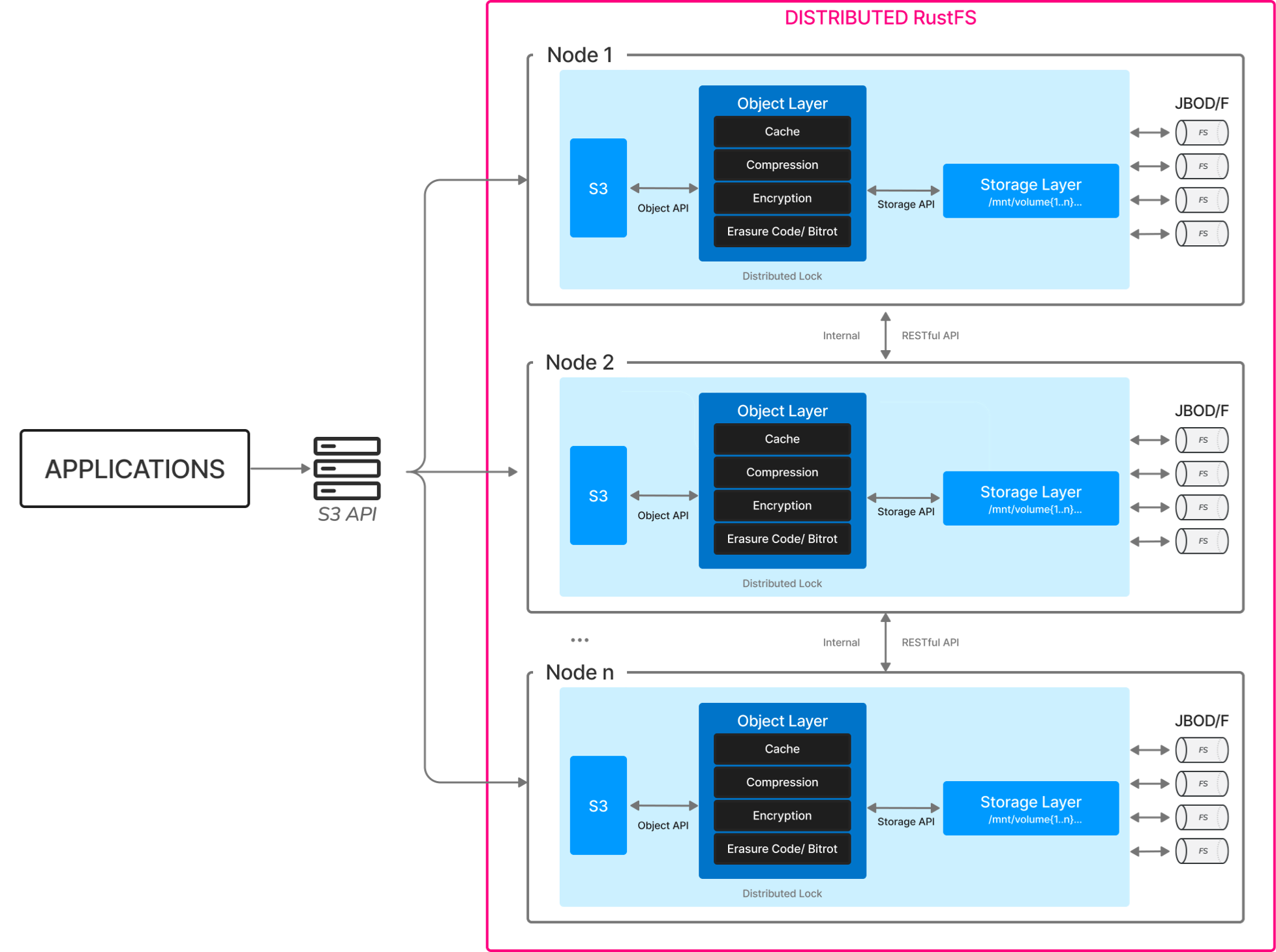Availability and Scalability Guide
Scaling Overview
RustFS supports horizontal scaling through adding new storage pools (Server Pools). Each new storage pool must meet the following requirements:
- Nodes within the storage pool must use consecutive hostnames (e.g., node5-node8)
- All nodes within a single storage pool must use identical disk specifications (type/capacity/quantity)
- New storage pools must maintain time synchronization and network connectivity with the existing cluster

1. Pre-Scaling Preparation
1.1 Hardware Planning Requirements
| Item | Minimum Requirements | Recommended Production Configuration |
|---|---|---|
| Node Count | 4 nodes/pool | 4 - 8 nodes/pool |
| Node Memory | 128 GB | 128 GB |
| Disk Type | SSD | NVMe SSD |
| Disk Capacity | ≥1 TB | ≥4 TB |
| Network Bandwidth | 10 Gbps | 25 Gbps |
1.2 System Environment Check
bash
# Check hostname continuity (new nodes example)
cat /etc/hosts
192.168.10.5 node5
192.168.10.6 node6
192.168.10.7 node7
192.168.10.8 node8
# Verify time synchronization status
timedatectl status | grep synchronized
# Check firewall rules (all nodes need ports 7000/7001 open)
firewall-cmd --list-ports | grep 70002. Scaling Implementation Steps
2.1 New Node Basic Configuration
bash
# Create dedicated user (execute on all new nodes)
groupadd rustfs-user
useradd -M -r -g rustfs-user rustfs-user
# Create storage directories (8 disks example)
mkdir -p /data/rustfs{0..7}
chown -R rustfs-user:rustfs-user /data/rustfs*2.2 Install RustFS Service
bash
# Download latest binary package (version must match existing cluster)
wget https://dl.rustfs.com/rustfs/v2.3.0/rustfs -O /usr/local/bin/rustfs
chmod +x /usr/local/bin/rustfs
# Create configuration file (/etc/default/rustfs)
cat <<EOF > /etc/default/rustfs
RUSTFS_ROOT_USER=admin
RUSTFS_ROOT_PASSWORD=YourSecurePassword
RUSTFS_VOLUMES="/data/rustfs{0...7}"
RUSTFS_ADDRESS=":7000"
RUSTFS_CONSOLE_ADDRESS=":7001"
EOF2.3 Cluster Scaling Operation
bash
# Update configuration on all existing nodes (add new storage pool)
sed -i '/RUSTFS_VOLUMES/s|"$| http://node{5...8}:7000/data/rustfs{0...7}"|' /etc/default/rustfs
# Global service restart (execute simultaneously on all nodes)
systemctl restart rustfs.service3. Post-Scaling Verification
3.1 Cluster Status Check
bash
# Check node join status
curl -s http://node1:7001/cluster/nodes | jq .poolMembers
# Verify storage pool distribution
rc admin info cluster3.2 Data Balance Verification
bash
# Check data distribution ratio (should approximate storage pool capacity ratio)
watch -n 5 "rustfs-admin metrics | grep 'PoolUsagePercent'"4. Important Notes
- Rolling Restart Prohibited: All nodes must be restarted simultaneously to avoid data inconsistency
- Capacity Planning Recommendation: Plan next scaling when storage utilization reaches 70%
- Performance Tuning Recommendations:
bash
# Adjust kernel parameters (all nodes)
echo "vm.swappiness=10" >> /etc/sysctl.conf
echo "net.core.somaxconn=32768" >> /etc/sysctl.conf
sysctl -p5. Troubleshooting Guide
| Symptom | Check Point | Fix Command |
|---|---|---|
| New node cannot join cluster | Check port 7000 connectivity | telnet node5 7000 |
| Data distribution imbalance | Check storage pool capacity configuration | rustfs-admin rebalance start |
| Console shows abnormal node status | Verify time synchronization status | chronyc sources |
Note: This document is based on the latest version of RustFS. Please ensure full data backup before scaling operations. For production environments, we recommend consulting with RustFS technical support engineers for solution review.